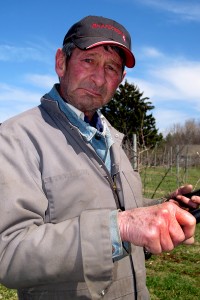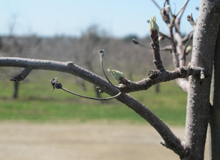 [1]
[1]Robert Dunnett stands aside his apple trees on his orchard in Brighton. The early dose of sunshine we got this year, combined with the recent below-zero temperatures, has posed a threat to his trees. Photo by Kurt Weiss
Robert Dunnett admits he loves the sunshine, but when it comes to his apple orchard in Brighton, it may have come too early.
“I love the heat just as much as anyone, but it throws everything so far out of whack,” he said.
This year, because of the early heat wave, he was already forced to start a seasonal spraying of his crops last Thursday. Now that the temperature has plummeted below zero, his apples are at risk.
After the early dose of summer we had last week, Dunnett, whose family has owned the same orchard land in Brighton for over 100 years, is left one month ahead of schedule. Normally, he said his trees start blossoming around May 22nd.
Two years ago, Dunnett was spraying in early April and he thought that was early. Normally, the time for spraying is around April 20.
“If anybody ever told me they’d be spraying in March, I’d say they’re nuts,” he said.
 [2]
[2]The apple buds shown here are blossoming already. Because of the sunshine we got, this is one month ahead of the normal schedule. Photo by Kurt Weiss
Leslie Huffman, an apple specialist with the Ontario ministry of agriculture, said the growth stage of the apple trees in the Belleville area has progressed to half inch green. That is when the ends of the apple tree branches are showing ½ inch of green out of the bud of the flower. That’s supposed to come in late April, said Huffman.
Huffman said when the temperature goes down to about -5C, there is about a 10% bud kill. In the -7C to -9C range, there will be 90% bud kill. If temperatures continue to sit below zero, the damage is not very noticeable because it is a small tissue in the centre of the flower – the pistil – that can be severely damaged.
“Without the pistil, there is no seed, and without the seed, there will be no fruit,” she said.
The frost is not unusual, Dunnett said, but when the flowers are budding, it puts them in a vulnerable position for freezing temperatures.
Both Dunnett and Huffman agree the most susceptible period of the growth stage is yet to come.
“As the flowers progress from the [half inch green] stage, they will become less tolerant of cold temperatures,” Huffman said.
To counteract the problem, there are medium-sized blowers that can be attached to a tractor, which regulate the airflow across the crops. They are supposed to suck the cold air off the ground and push it upwards. Then, that cold air settles and pushes the warm air down with it. There were around 500 in the province last year.
Everything comes at a cost.
“I will get one, but I haven’t got an extra ten grand to throw at it,” he said.
In the meantime, apple growers will continue to monitor the weather and hope there are not too many more sudden temperature changes.
“I can’t do anything about it, but bring it on,” Dunnett said.
Dunnett Orchards is located on Dundas St. E in Brighton.